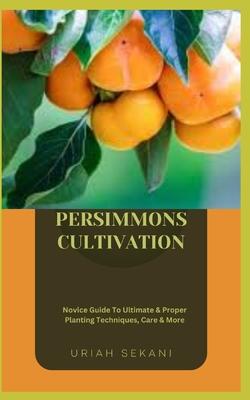
Book
Persimmons Cultivation: Novice Guide To Ultimate & Proper Planting Techniques, Care & More
by Uriah Sekani
(Write a Review)
Paperback
$9.35
Both astringent and non-astringent persimmons are common. Hachiya persimmons, like most astringent varieties, have a heart shape and are only edible when they are very ripe and tender. High quantities of tannins give them a harsh, puckering flavor. The Fuyu kind of persimmon is non-astringent; it is smaller and has the shape of a tomato. When they are mature and hard, like apples, they are delicious.
- The skin of a persimmon is shiny and smooth; it can be any shade of orange or red. Different varieties have slightly different shapes, although most are either spherical or slightly elongated.
- When mature, persimmons have a flavor that is somewhere between honey and apricot or mango or honeydew melon. Once fully ripe, astringent persimmons become even sweeter as the tannins evaporate.
- Health Benefits: Rich in fiber, vitamins A and C, and minerals like potassium and manganese, persimmons are a healthy addition to any diet. Antioxidants such as beta-carotene and lycopene can be found in abundance.
- In the kitchen, persimmons can be used in a number of different ways. You can eat them raw in salads, fruit bowls, or as a topping for sweets. In addition to eating them fresh, persimmons have several culinary applications. To make them last longer, several civilizations have taken to drying or preserving them.
- Persimmons are normally picked in the late fall or early winter, though this varies greatly by variety and geographic area. Because of their short growing season, they are most commonly used in holiday recipes.
- Persimmons are good for you in many ways, including your health. In addition to lowering the risk of chronic diseases, their high fiber content also improves digestive health. The persimmon's vitamin and mineral content also helps the immune system and general health.
- The persimmon has significant cultural meaning in many countries. In Japan, for instance, they are regarded with great respect because of the good fortune they bring in the fall. Dried persimmons are a popular snack in several parts of Asia.
Although persimmons pose no significant health risks when consumed in moderation, they may trigger allergic reactions in certain people. Always start slowly when trying a new cuisine to see how your system reacts.
Persimmons are a delectable and nutritious fruit that may be used to enhance the flavor of many different dishes.
Both astringent and non-astringent persimmons are common. Hachiya persimmons, like most astringent varieties, have a heart shape and are only edible when they are very ripe and tender. High quantities of tannins give them a harsh, puckering flavor. The Fuyu kind of persimmon is non-astringent; it is smaller and has the shape of a tomato. When they are mature and hard, like apples, they are delicious.
- The skin of a persimmon is shiny and smooth; it can be any shade of orange or red. Different varieties have slightly different shapes, although most are either spherical or slightly elongated.
- When mature, persimmons have a flavor that is somewhere between honey and apricot or mango or honeydew melon. Once fully ripe, astringent persimmons become even sweeter as the tannins evaporate.
- Health Benefits: Rich in fiber, vitamins A and C, and minerals like potassium and manganese, persimmons are a healthy addition to any diet. Antioxidants such as beta-carotene and lycopene can be found in abundance.
- In the kitchen, persimmons can be used in a number of different ways. You can eat them raw in salads, fruit bowls, or as a topping for sweets. In addition to eating them fresh, persimmons have several culinary applications. To make them last longer, several civilizations have taken to drying or preserving them.
- Persimmons are normally picked in the late fall or early winter, though this varies greatly by variety and geographic area. Because of their short growing season, they are most commonly used in holiday recipes.
- Persimmons are good for you in many ways, including your health. In addition to lowering the risk of chronic diseases, their high fiber content also improves digestive health. The persimmon's vitamin and mineral content also helps the immune system and general health.
- The persimmon has significant cultural meaning in many countries. In Japan, for instance, they are regarded with great respect because of the good fortune they bring in the fall. Dried persimmons are a popular snack in several parts of Asia.
Although persimmons pose no significant health risks when consumed in moderation, they may trigger allergic reactions in certain people. Always start slowly when trying a new cuisine to see how your system reacts.
Persimmons are a delectable and nutritious fruit that may be used to enhance the flavor of many different dishes.
Paperback
$9.35